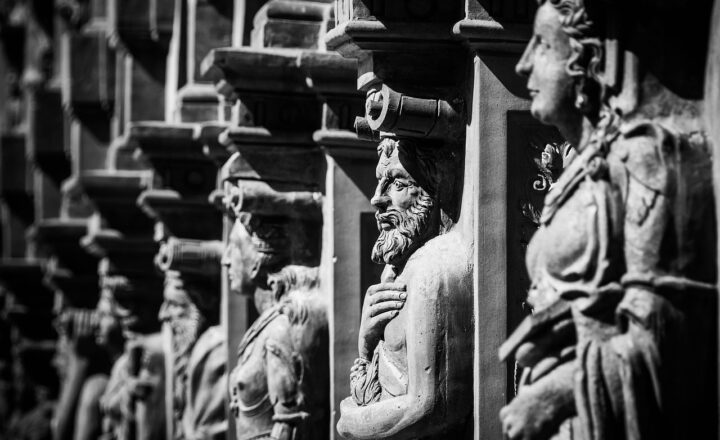How People Have Evolved from Ancient Myths to Scientific Knowledge
November 15, 2024

The journey of human understanding has traversed a winding path from ancient myths to modern scientific knowledge. This evolution reflects humanity’s quest for meaning, truth, and a deeper comprehension of the universe around us.
1. The Role of Myths in Early Societies
In ancient societies, myths served as the primary understanding of the world. They explained everything from the origins of life to natural phenomena. Myths were not merely tales but held profound significance—they were the lenses through which early humans viewed life.
Myths provided frameworks for:
- Understanding Nature: Early humans attributed natural disasters, such as storms and earthquakes, to the wrath of gods or supernatural beings. This provided a sense of control, believing rituals could appease the deities.
- Cultural Identity: Myths solidified cultural values and social norms. They served as a shared narrative that united members of a community, providing a collective identity.
- Moral Guidance: Many myths contained moral lessons that taught communities about virtues and vices, shaping ethical behavior through storytelling.
Their narratives may seem fantastical today, but they were once essential for imparting knowledge and facilitating understanding in a world rife with uncertainty.
2. The Transition to Philosophy and Rational Thought
As societies evolved, so did their methods of inquiry. The transition from mythological explanations to philosophical reasoning marked a significant turning point in human understanding. This shift was characterized by the emergence of early philosophers who began to question and rationalize the narratives of myths.
Key developments during this period included:
- Critical Thinking: Thinkers like Socrates, Plato, and Aristotle promoted the value of reason, logic, and evidence-based inquiry. They emphasized questioning accepted beliefs and pursuing knowledge through dialogue and observation.
- Natural Philosophy: Disciplines we now call science began to take shape. For instance, rather than attributing the motion of celestial bodies to the gods, thinkers started theorizing about gravitational forces and planetary motion.
- Systematic Observation: Philosophers began rigorous methods of observing the world around them, documenting their findings—a precursor to the scientific method that would become prominent in later centuries.
Philosophy laid the groundwork for a more systematic approach to seeking knowledge and understanding, moving away from emotional narratives to logical deduction.
3. The Scientific Revolution: Challenging Established Beliefs
The Scientific Revolution of the 16th and 17th centuries marked a dramatic shift in humanity’s quest for knowledge. This era was characterized by groundbreaking discoveries that challenged existing beliefs and led to the collapse of longstanding mythological perspectives on nature.
Significant components of this period included:
- Empirical Evidence: With figures like Galileo and Copernicus challenging geocentric theories, the focus shifted dramatically to observable phenomena. Evidence became the central pillar of knowledge, relegating myths to the realm of fiction.
- The Scientific Method: The development of the scientific method introduced systematic experimentation as a means of inquiry. This method required hypotheses to be tested against empirical data and observations, leading to repeatable results.
- Integration of Mathematics: The application of mathematics to scientific problems opened new pathways of understanding, allowing for advancements in physics, astronomy, biology, and chemistry. Mathematics became the language of science, providing clarity to complex phenomena.
This period profoundly altered humanity’s worldview, replacing superstition with a reliance on reason and empirical evidence.
4. Modern Science: A Global Endeavor
The 19th and 20th centuries ushered in an era where scientific knowledge expanded exponentially. With globalization and technological advancements, different cultures began to contribute their perspectives to the global scientific landscape.
Key aspects of this modern era include:
- Collaboration Across Borders: Science has become a collaborative effort. International research initiatives transcend national boundaries, blending ideas and methodologies from various cultures to drive innovation and discovery.
- Specialization of Knowledge: The explosion of specialized fields—from genetics to quantum physics—illustrates how knowledge has become more complex. This specialization reflects both the depth of inquiry and the ever-growing range of topics explored by scientists.
- Ethics and Responsibility: With advancements in technology and science (such as genetic engineering and artificial intelligence), ethical considerations carry immense weight. The challenge thus lies in integrating scientific progress with moral responsibility to humanity and the planet.
Modern science represents the culmination of thousands of years of inquiry, demonstrating humanity’s relentless pursuit of knowledge in an ever-evolving context.
5. The Interplay of Science and Myth Today
Even though we’ve made significant strides towards scientific understanding, remnants of myths still echo in contemporary society. The interplay between science and myth continues to shape culture and perception in various ways:
- Cultural Narratives: Myths continue to inform modern storytelling, art, and literature, acting as metaphors for the human condition and moral lessons that resonate across time.
- Science Communication: Science often employs narrative structures to make complex topics more relatable to the general public. The language of myth can be an effective tool in bridging the gap between scientific knowledge and public understanding.
- Spiritual and Ethical Debates: Questions regarding the implications of scientific advancements (e.g., cloning, AI) often intersect with spiritual beliefs rooted in ancient myths, thus sparking ethical debates that merge both domains.
This synthesis of scientific understanding and cultural mythos illustrates the complexity of the human experience, demonstrating that while our methods of knowledge may have evolved, the essential quest for meaning remains unchanged.
Conclusion: The Ongoing Journey of Knowledge
The evolution from ancient myths to scientific knowledge reflects humanity’s enduring curiosity and desire to understand the world. Though the journey has taken us from the realms of the fantastical to the empirical, the interplay between myth and science underscores the richness of human thought. As we look to the future, one thing remains clear: the quest for knowledge will continue, weaving together our stories, beliefs, and truths into a deeper understanding of ourselves and the universe.








